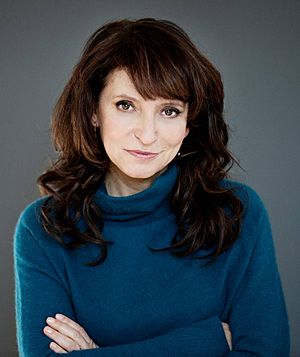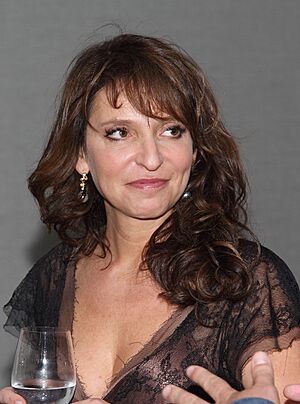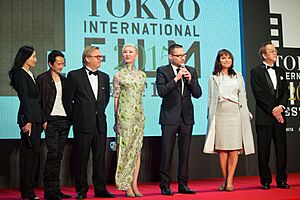Susanne Bier facts for kids
Quick facts for kids
Susanne Bier
|
|
|---|---|

Bier in 2011
|
|
| Born | 15 April 1960 Copenhagen, Denmark
|
| Alma mater | Bezalel Academy of Arts and Design, Architectural Association in London, National Film School of Denmark |
| Occupation |
|
| Years active | 1991–present |
| Spouse(s) | Tómas Gislason (198?–?; divorced) Philip Zandén (1995–?; divorced) Jesper Winge Leisner (?-present) |
| Children | Gabriel Bier Gislason, Alice Bier Zandén |
Susanne Bier (born April 15, 1960) is a famous Danish filmmaker. She is known for directing many popular movies and TV shows. Susanne Bier is the first female director to win an Academy Award (also called an Oscar), a Golden Globe Award, a European Film Award, and a Primetime Emmy Award. She won these awards for her films like In a Better World and the TV series The Night Manager.
Bier started her career with the film Freud's Leaving Home in 1991. She has directed many other films, including Open Hearts (2002), Brothers (2004), After the Wedding (2006), and In a Better World (2010). In a Better World won an Oscar for Best International Feature Film. She also directed English-language films like Things We Lost in the Fire (2007) and Bird Box (2018).
On television, she directed the miniseries The Night Manager (2016), which earned her a Primetime Emmy Award. She also directed The Undoing (2020), The First Lady (2022), and The Perfect Couple, which premiered in September 2024.
Contents
Early Life and Education
Susanne Bier was born in Copenhagen, Denmark, on April 15, 1960. Her family was Jewish. Her father's family moved to Denmark from Germany in 1933 to escape the rise of Hitler. Her mother's family came to Denmark from Russia earlier in the 20th century to escape unfair treatment.
In 1943, both families had to flee from Denmark to Sweden, along with many other Danish Jews, to avoid being sent to Nazi camps. They returned to Denmark three years after World War II ended. Because of these experiences, Bier's parents taught their children strong moral values. Later, the idea of people being strong and keeping their dignity would become an important theme in her films.
During her school years, she went to Niels Steensens Gymnasium. As an adult, Bier said in interviews that she wasn't very social as a child. She liked playing football with boys and preferred reading books over spending time with others.
After high school, she wanted to learn more about her Jewish background. So, she studied art at the Bezalel Academy of Arts and Design in Jerusalem. Later, she studied architecture in London. Finally, she decided to focus on film and graduated from the National Film School of Denmark in 1987. Her graduation film, De Saliges (1987), won first prize at a film festival in Munich.
Career Highlights
Early Films and Breakthrough
After directing music videos and commercials, Susanne Bier made her first feature film, Freud's Leaving Home, in 1991. This film was praised by critics. It followed a girl named Freud from Sweden, who came from a Jewish family. It was one of the first films in Sweden to show Swedish-Jewish culture.
She continued to direct films like Family Matters (1993) and Like It Never Was Before (1995). In 1997, she directed Credo.
In 1999, Bier had a big success in Denmark with The One and Only. This romantic comedy was about how fragile life can be. It won several Danish Film Academy awards and became one of the most successful Danish films ever.
International Recognition
Bier gained wider international attention with Open Hearts in 2002. This film explored difficult topics like broken lives and tragedies. It was made using the rules of Dogme 95, which meant a more simple and realistic style of filmmaking.
Her next films, Brothers (2004) and After the Wedding (2006), continued to earn her praise. After the Wedding was even nominated for an Oscar for Best Foreign Language Film in 2007.
After directing her first American film, Things We Lost in the Fire (2007), she won an Oscar for Best Foreign Language Film for In a Better World (2010).
Notable Films and Television Work
In 2002, Bier directed Open Hearts. This film tells the story of two couples whose lives are changed by a car crash and difficult relationships. Critics loved Open Hearts, and it won awards like the International Critics Award at the Toronto International Film Festival.
Bier's 2004 film, Brothers, follows two brothers, Michael and Jannik. Michael, a soldier, is sent to Afghanistan. His helicopter is shot down, and he is thought to be dead. While he is gone, his younger brother Jannik helps take care of Michael's family. The film explores the challenges soldiers face and the effects of war on families. It won several awards, including an audience award at the Sundance Film Festival.
Her film After the Wedding (2006) tells the story of Jacob Petersen, who runs an orphanage in India. He works hard to keep the orphanage going and cares deeply for the children. This film was very successful and was nominated for an Oscar.
In 2010, Bier directed In a Better World. This drama film takes place in a small Danish town and a refugee camp in Africa. It explores how quickly people, both children and adults, can feel that something is deeply unfair. The film won the Golden Globe Award and the Oscar for Best Foreign Language Film.
In 2012, Bier directed Love Is All You Need, a romantic comedy starring Pierce Brosnan. This film was chosen as the best comedy film at the 26th European Film Awards in 2013.
In 2014, she directed Serena, a drama starring Jennifer Lawrence and Bradley Cooper. She also directed the Danish thriller A Second Chance in the same year.
Moving to Television
Susanne Bier took a break from films to direct The Night Manager in 2016. This British TV series starred Tom Hiddleston and Hugh Laurie. It was very popular and won many awards, including an Emmy for Bier's directing.
After The Night Manager, Bier directed the American horror film Bird Box (2018), starring Sandra Bullock. This film became one of the most-watched films on Netflix.
She then directed the TV series The Undoing (2020) for HBO, starring Nicole Kidman and Hugh Grant. This show became HBO's most-watched series of 2020.
Most recently, Bier directed The First Lady (2022) for Showtime, starring Viola Davis and Michelle Pfeiffer. She also directed The Perfect Couple, a limited TV series that premiered on Netflix in September 2024.
Directing Style and Themes
Susanne Bier's films often look at how families deal with big changes, like global events, terrorism, or war. She is interested in moments when people's sense of safety is shaken. Her films often ask moral questions, such as how far someone would go to help a child in trouble.
Bier gives her actors a lot of freedom, allowing them to improvise lines and actions. Her films often use a handheld camera style and extreme close-ups of faces and hands to show strong emotions. Even though her films often deal with sad topics, she makes sure to end them with a hopeful feeling. She believes it's important to connect with her audience and give them some light.
Personal Life
Susanne Bier was first married to Danish-Icelandic film director Tómas Gislason. They have a son, Gabriel Bier Gislason, who also works in the film industry.
Later, she married Swedish actor and director Philip Zandén. They have a daughter, Alice Bier Zandén, who is an actress.
After her divorce from Zandén, her partner became Danish singer and composer Jesper Winge Leisner. He has written music for several of her films.
Filmography
Film
| Year | English title | Original title | Director | Writer | Producer | Notes |
|---|---|---|---|---|---|---|
| 1989 | Notes on Love | Notater om kærligheden | No | Additional | No | Also assistant director |
| 1991 | Freud's Leaving Home | Freud flyttar hemifrån... | Yes | Additional | No | Directorial debut |
| 1992 | Brev til Jonas | Yes | No | No | Cameo as "Director"; short film | |
| 1993 | Family Matters | Det bli'r i familien | Yes | No | No | |
| 1995 | Like It Never Was Before | Pensionat Oskar | Yes | No | No | |
| 1997 | Credo | Sekten | Yes | Yes | No | |
| 1999 | The One and Only | Den eneste ene | Yes | Idea | Executive | |
| 2000 | Once in a Lifetime | Livet är en schlager | Yes | No | No | |
| 2002 | Open Hearts | Elsker dig for evigt | Yes | Yes | No | |
| 2004 | Brothers | Brødre | Yes | Story | No | |
| 2006 | After the Wedding | Efter brylluppet | Yes | Story | No | |
| 2007 | Things We Lost in the Fire | Things We Lost in the Fire | Yes | No | No | |
| 2010 | In a Better World | Hævnen | Yes | Story | No | |
| 2012 | Love Is All You Need | Den skaldede frisør | Yes | Story | No | |
| 2014 | A Second Chance | En chance til | Yes | Story | No | |
| Serena | Serena | Yes | No | Yes | ||
| 2018 | Bird Box | Bird Box | Yes | No | Executive | |
| 2022 | A ciegas | No | No | Executive | ||
| 2026 | Practical Magic 2 | Practical Magic 2 | Yes | No | No |
Television
| Year | Title | Director | Producer | Story Editor | Notes | Ref. |
|---|---|---|---|---|---|---|
| 1988 | Fridtjof Nansens fodspor over Indlandsisen | No | No | Yes | Television documentary film | |
| 1993 | Luischen | Yes | No | No | Television film | |
| 2016 | The Night Manager | Yes | Yes | No | Miniseries (6 episodes) | |
| 2020 | The Undoing | Yes | Yes | No | Miniseries (6 episodes) | |
| 2022 | The First Lady | Yes | Yes | No | Miniseries (10 episodes) | |
| 2024 | The Perfect Couple | Yes | Yes | No | Miniseries (6 episodes) |
Music video
| Year | Title | Musician | Notes | Ref. |
|---|---|---|---|---|
| 1989 | Summer Rain | Alphaville |
Awards and Nominations
- Freud's Leaving Home (1991)
- 1992 Angers European First Film Festival
- Audience Award: Feature Film
- C.I.C.A.E. Award
- 1992 Creteil International Women's Film Festival
- Grand Prix
- 1992 Guldbagge Awards
- Best Director (Nominated)
- 1991 Montréal World Film Festival
- Montréal First Film Prize – Special Mention
- Brev til Jonas (1992)
- 1993 Robert Festival
- Best Short/Documentary
- Family Matters (1994)
- 1994 Rouen Nordic Film Festival
- ACOR Award
- Audience Award
- Like It Never Was Before (1995)
- 1995 Montréal World Film Festival
- FIPRESCI Prize: Official Competition
- The One and Only (1999)
- 2000 Robert Festival
- Best Film
- 2000 Bodil Awards
- Best Film
- Open Hearts (2002)
- 2002 Toronto International Film Festival
- International Critics' Award (FIPRESCI) – Special Mention
- 2003 Bodil Awards
- Best Film
- 2002 Lübeck Nordic Film Days
- Baltic Film Prize for a Nordic Feature Film
- 2003 Robert Festival
- Audience Award
- 2003 Rouen Nordic Film Festival
- Press Award
- Brothers (2004)
- 2005 Boston Independent Film Festival
- Audience Award: Narrative
- 2005 Creteil International Women's Film Festival
- Audience Award: Best Feature Film
- 2004 Hamburg Film Festival
- Critics Award
- 2005 Skip City International D-Cinema Festival
- Grand Prize
- 2005 Sundance Film Festival
- Audience Award: World Cinema – Dramatic
- After the Wedding (2006)
- 2007 Festroia International Film Festival
- Jury Special Prize
- 2006 Film by the Sea International Film Festival
- Audience Award
- 2006 Cinefest Sudbury International Film Festival
- Audience Award
- In a Better World (2010)
- 2011 Academy Awards
- Best Foreign Language Film
- 2011 European Film Awards
- Best Director
- 2011 Golden Globes, Italy
- Best European Film
- 2010 Rome Film Festival
- Audience Award
- Grand Jury Prize
- Love is All You Need (2012)
- 2013 Robert Festival
- Audience Award: Comedy
- The Night Manager (2016)
- 2016 Primetime Emmy Awards
- Outstanding Directing for a Limited Series, Movie, or Dramatic Special
See also
 In Spanish: Susanne Bier para niños
In Spanish: Susanne Bier para niños
 | Jewel Prestage |
 | Ella Baker |
 | Fannie Lou Hamer |



